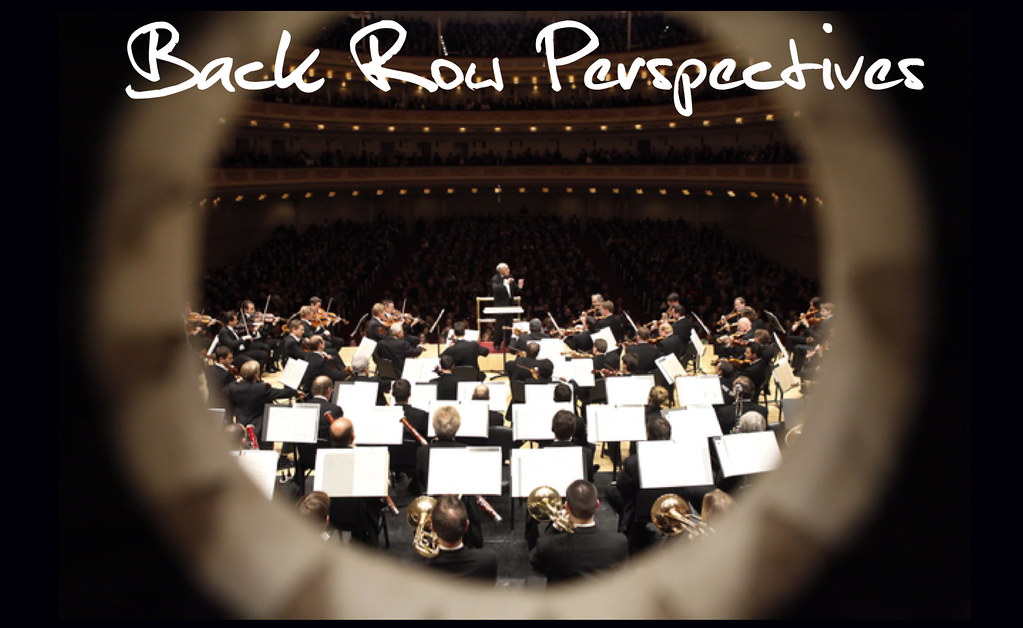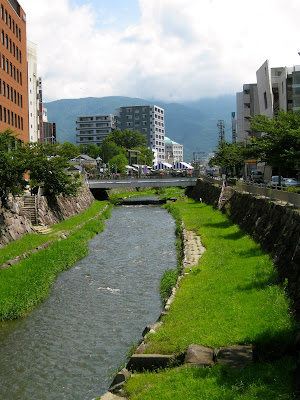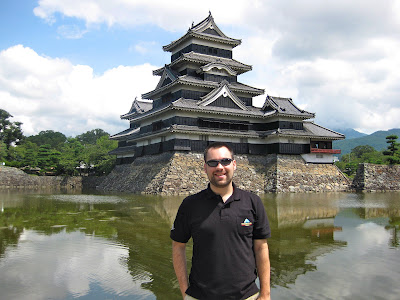The Saito Kinen Festival Orchestra gave this year's final concert in Matsumoto this afternoon, and boy was it a good 'un! As I've mentioned in previous posts, the best part of this whole experience has been the music, as it should be.
The festival started out with lots of rehearsals, sometimes for 5 and 6 hours at a time. In fact, the entire first week I was here was nothing but rehearsals. I suppose they just want the orchestra to sound polished, which is not at all guaranteed when you assemble an orchestra with personnel that have never really played together. Plus there's the pressure of having everything recorded for national broadcast and an eventual DVD/CD release.
All that rehearsing definitely payed off, because the orchestra performed both Miraculous Mandarin and Bluebeard's Castle really well. I had never performed the full-length ballet version of Mandarin before, just the concert suite with the VPO back in March, and it was really interesting to hear and play the eerie conclusion to what is probably my favorite Bartók piece. And what fun it is to play! John Engelkes, bass trombonist in the San Francisco Symphony, played beautifully in all his big solos. There are quite a few trombone features (Bartók makes liberal use of glissandi to symbolize sensuality) and I had a blast performing them alongside John as well as Koichi Inoue, a fine freelance player from Tokyo.
 |
| The section for Bluebeard and Mandarin. Shin, me, Mayumi, Koichi, and John |
If there's one thing I've learned from 4 years in the VPO, it's that there is PLENTY of mind-blowingly beautiful music that involves the trombones very little, or not at all. Bluebeard's Castle is a fine example. Bartók's writing is truly masterful, with great themes, drama, and a great variety of colors and sounds to complement the bizarre storyline. It was truly a joy to 'sit through' all four performances here in Matsumoto.
The opera/ballet production was made even more special on opening night when the festival's director, Seiji Ozawa, began the evening by conducting the strings in an emotional tribute to the victims of the March 11th earthquakes and tsunami. The piece was Bach's famous Aria (known to many as Air on a G String), and Maestro Ozawa shaped it so masterfully that many in the orchestra consider it the musical highlight of the festival. As I sat with my eyes closed and soaked it all it, I couldn't help but replay in my mind the terrible images of the utter devastation from March, and was more than a little surprised to find that when I opened my eyes my vision was blurry with tears. I was certainly not alone in that. It made me proud in that moment to be sitting amongst the proud Japanese people and to be participating in some miniscule way in helping to return life back to normal after such an enormous national tragedy.
We were all shocked to find out upon arriving at the opera house for the 2nd performance that Ozawa had developed a serious case of pneumonia and was being hospitalized. He has been in bad health for some time now, especially following a bout with esophageal cancer a couple years ago, but his youthful demeanor and energy in rehearsals made it seem he was perfectly fine. The assistant conductor had to step in with a grand total of 'zero' rehearsals under his belt. Bluebeard is not an easy opera to conduct, but with the orchestra and singers rallying behind him, he did a fantastic job. Seiji was eventually able to return for the final performance and was rewarded for his efforts with a massive reception from orchestra and audience alike. It was a really special moment to see him bounding up on stage for curtain call after having been so ill just a few days before.
For the orchestra concert side of things, the program is Tchaikovsky with a bit of Bartók thrown in for good measure. I am having so much fun playing with this section, which consists of Massimo La Rosa (principal trombonist, Cleveland Orchestra), Randy Hawes (bass trombone, Detroit Symphony), and Yasuhito Sugiyama (tuba, Cleveland Orchestra). I've known of all three of these guys for a long time, and it's so great to get to perform with them. We mesh really well, and everything is SO easy. Guess that's how it's supposed to be. Plus, they're all great guys.
 |
| SKO 2011 section: Massimo, me, Randy, and Yasuhito |
The program begins with one of my favorite Tchaikovsky works, Overture and Fantasy from Romeo and Juliet. Say what you want about 'Tchaik', but that guy could write some melodies. We've had two concerts so far, and the soloists have been fantastic every time, especially the woodwinds and horn (Neil Deland, Toronto Symphony). Second on the program is Bartók's Piano Concerto No. 3, another delight that came out of nowhere and has instantly become a new favorite, especially the gorgeous 2nd movement. Who knew he wrote anything besides Concerto for Orchestra? I'm embarrassed to say my knowledge of Bartók repertoire has been tripled at this festival! The concert finishes with a spirited and energetic version of Tchaikovsky's Symphony No. 4, a piece I've wanted to play for a long time. The brass section is let loose, indeed encouraged, by the talented young Venezuelan conductor Diego Matheuz, and we certainly take advantage of that freedom... tastefully and musically, of course. :) I have immensely enjoyed the orchestra programs so far, and can't wait to perform another couple times in China.
On that note, I'll sign off for today. Look for updates from Beijing and Shanghai in the next few days!
PS - After the last concert on Sunday evening, the festival threw a big farewell party. The spread was amazing, but the thing I will always remember is the GIANT tuna that was wheeled in during the festivities.
 |
| This is what happens when you tell a piccolo player to make a funny face... |
The crowd gathered 'round as a sushi chef expertly sliced and diced the mammoth fish to feed the multitudes. CRAZY! Only in Japan, I guess. And no, I did not partake.












